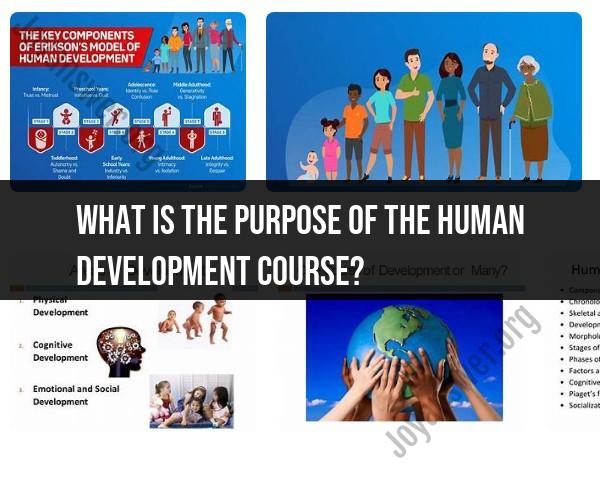What is the purpose of the Human Development course?
A course in Human Development serves various purposes and goals, primarily focused on understanding the growth and development of individuals across the lifespan. The purpose of such a course typically includes:
Understanding Human Growth and Development:
- The primary goal of a Human Development course is to provide students with a comprehensive understanding of how humans grow and develop physically, cognitively, and emotionally from infancy to old age. This knowledge helps individuals appreciate the complexities of human life and development.
Promoting Personal Growth and Self-Awareness:
- Human Development courses often encourage personal reflection and self-awareness. By learning about developmental theories and stages, students can gain insights into their own lives, experiences, and personal growth.
Informing Parenting and Caregiving:
- The course equips individuals, especially future parents and caregivers, with the knowledge and skills needed to understand and support the development of children and adolescents. It provides insights into effective parenting strategies and child-rearing practices.
Supporting Professional Development:
- For individuals pursuing careers in fields like education, psychology, social work, healthcare, and counseling, a Human Development course provides a foundational understanding of human development, enabling them to better serve their clients or students.
Enhancing Interpersonal and Communication Skills:
- Understanding the developmental stages and challenges that individuals go through can improve interpersonal skills and communication. This is valuable in various personal and professional relationships.
Informing Policy and Social Change:
- Human Development courses can empower students to advocate for social policies and changes that better support human development. This knowledge can be used to address social issues related to children, families, and aging populations.
Promoting Lifelong Learning:
- The course fosters a commitment to lifelong learning and curiosity about human behavior and development. It encourages students to stay informed about research and developments in the field.
Encouraging Critical Thinking and Research Skills:
- Human Development courses often involve critical analysis of research findings and theories. Students develop the skills to evaluate and critique research, which is valuable for making informed decisions in various areas of life.
Cultural and Global Awareness:
- Human Development courses may explore the impact of culture, environment, and societal norms on development. This fosters cultural awareness and a global perspective on human development.
Promoting Well-Being and Resilience:
- Understanding the challenges and obstacles that individuals face at different life stages can promote empathy and resilience. It encourages individuals to seek support and coping strategies during challenging times.
Fostering an Inclusive and Diverse Perspective:
- The course often covers topics related to diversity, including issues related to gender, race, ethnicity, and socioeconomic factors. This helps students appreciate the diverse experiences of individuals as they develop.
Overall, a Human Development course serves the purpose of educating individuals about the physical, cognitive, and emotional changes that occur throughout the human lifespan, with a focus on personal growth, caregiving, professional development, and promoting well-being in society. It provides valuable insights into the complexity of human life and the factors that influence human development.
Understanding the Purpose of Human Development Courses
Human development courses provide students with the knowledge and skills they need to understand and promote human growth and development across the lifespan. These courses typically cover a wide range of topics, including:
- Physical development
- Cognitive development
- Social and emotional development
- Moral and ethical development
- Cultural development
Human development courses are designed to help students:
- Understand the factors that influence human growth and development
- Identify and support the needs of individuals at different stages of development
- Promote positive development outcomes
- Create a more just and equitable society for all
Topics and Content Covered in Human Development Education
Human development education covers a wide range of topics, including:
- Prenatal development: This includes the physical, cognitive, and social-emotional development of the fetus and infant.
- Child development: This includes the physical, cognitive, and social-emotional development of children from infancy through adolescence.
- Adulthood development: This includes the physical, cognitive, and social-emotional development of adults from young adulthood through old age.
- Emerging adulthood: This is a relatively new stage of development that is characterized by identity exploration, instability, and self-focus.
- Late adulthood: This stage of development is characterized by physical and cognitive decline, as well as a focus on life review and legacy.
In addition to these general topics, human development education may also cover more specialized topics such as:
- Developmental psychopathology: This is the study of mental disorders in children and adolescents.
- Developmental neuroscience: This is the study of the brain and nervous system development.
- Developmental anthropology: This is the study of how culture influences human development.
Applications and Benefits of Human Development Knowledge
Knowledge of human development can be applied in a variety of settings, including:
- Education: Educators can use their knowledge of human development to create effective learning environments for students of all ages.
- Social work: Social workers use their knowledge of human development to help individuals, families, and communities cope with challenges and achieve their goals.
- Public policy: Public policymakers can use their knowledge of human development to create policies that support the development of all people.
- Parenting: Parents can use their knowledge of human development to raise healthy and well-adjusted children.
Career Paths and Opportunities for Human Development Graduates
Human development graduates have a variety of career options available to them. Some of the most common career paths include:
- Educator: Human development graduates can work as teachers, counselors, or school administrators in schools and other educational settings.
- Social worker: Human development graduates can work as social workers in hospitals, mental health clinics, and other social service agencies.
- Public policy analyst: Human development graduates can work as public policy analysts for government agencies, non-profit organizations, or private companies.
- Human resources specialist: Human development graduates can work as human resources specialists for businesses and other organizations.
- Parent educator: Human development graduates can work as parent educators in schools, community centers, and other settings.
Research and Innovation in the Field of Human Development
The field of human development is constantly evolving, and new research is being conducted all the time. Some of the current areas of focus in human development research include:
- The impact of early childhood experiences on later development
- The role of genes and environment in human development
- The effects of poverty and inequality on development
- The impact of technology on development
- The promotion of positive development outcomes throughout the lifespan
Human development research is essential for improving our understanding of how people grow and develop. This knowledge can be used to create more effective interventions and programs that support the development of all people.
Overall, human development is a broad and complex field that encompasses the physical, cognitive, social, emotional, moral, and ethical development of individuals across the lifespan. Human development knowledge can be applied in a variety of settings to improve the lives of individuals, families, and communities.













